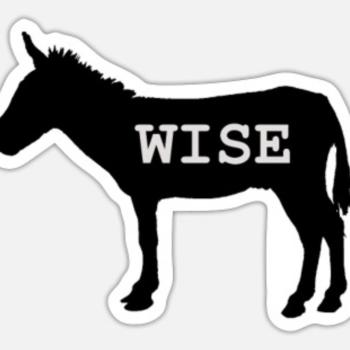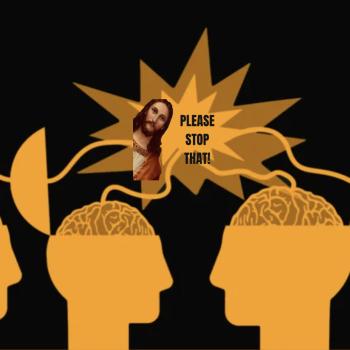
It’s something to witness in today’s world: watching people try to find their moral compass amidst collapsing institutions. Sure, no communal structure is perfect—but good God, man! With infinite access to conflicting information, clarity feels harder than ever. So how do we respond to our current predicament?
Jesus and the Jester Walk into an Empire
If Jesus and a medieval jester walked into a bar, they’d both get kicked out by security. Not for being drunk or disorderly—no, no. For saying something true in the wrong tone of voice.
Empires never like those kinds of people. The ones who smile too much, laugh at the powerful, and say weird stuff like “love your enemies” while everyone else is sharpening their pitchforks.
Let’s talk about the unlikely cosmic bromance between Jesus Christ—the Son of God, “rebel” rabbi, sandal model—and the Court Jester—the kingdom’s official wise fool, who made a career out of not getting beheaded for telling the truth.
Holy Fools: Two Sides of the Same Coin
At first glance, they couldn’t be more different. Jesus: sinless savior, water-walker, fish-multiplier. The jester? Chaotic goblin, pie-thrower, insult comic in tights.
But dig deeper, and you’ll see they’re playing the same game—just on different courts.
Both wield absurdity like a sword.
Jesus told stories about mustard seeds turning into trees, about poor people being the real winners, and about God throwing banquets for losers while the “in crowd” gets left out. That’s not a TED Talk. That’s satire disguised as theology.
Meanwhile, the jester stared down the king and said, “My lord, your kingdom smells like feet and your laws are as useful as a screen door on a submarine.” And somehow lived to tell the tale.
What gave them this power? They both understood the strength of absurd, loving truth in a world dominated by fear and ego.
A Different Kind of Kingdom
Let’s face it: most empires are built by men obsessed with power, allergic to questions, and so in love with money they practically try to marry it.
Into that chaos walk Jesus and the jester—barefoot, broke, and beaming like they know a secret.
And they do: the world doesn’t have to suck.
The Christ and the clown both show up bearing the same radical idea: that a different kind of kingdom is possible. One not built on dominance, PR, and endless control, but on love, humility, and the world’s worst hiring practices. (“Hey Peter, you’re a fisherman with impulse control problems. Want to be the rock I build my church on?”)
Neither one showed up to kiss rings or climb ladders. They stood at the bottom of the ladder, sawing off rungs and handing out balloon animals.
And now, in a state where warmongering oligarchs (red or blue) act against the will of the people, we need a reality shift more than ever.
Love Your Enemies—But Not in a Creepy Way
“Love your enemies,” Jesus said, with the spiritual equivalent of jazz hands. “Pray for those who persecute you.”
If you grew up hearing this in Sunday school, it might sound tame now. But let’s not forget: Jesus dropped this line in the middle of Roman-occupied Judea. That’s like walking into Hamas and shouting, “Hey guys, maybe we should just hug it out?”
It wasn’t tame. It was radical.
Jesus wasn’t an anarchist or a patriot. He was a pilgrim passing through.
And who else was poking at dictators while wearing a feathered cap? The jester, of course.
Jesters mocked the ruling class but secretly loved the people. They didn’t storm the castle—they whispered truth inside it. Rage was disarmed with humor. They understood that fighting fire with fire just gives you ash—and nobody likes a kingdom made of ash (too itchy).
Neither Jesus nor the jester played the revenge game. They short-circuited the whole system by playing something entirely different. One where good wins—not by overpowering evil, but by refusing to become it.
Can we do the same?
Ridiculous Headgear, Real Wisdom
These two both wore absurd crowns.
Jesus got a crown of thorns, a brutal joke from the Romans. The jester wore a hat with bells and ears, a joke on himself.
Yet both were marked as outsiders—not trying to win, but to wake people up.
Imagine the empire’s confusion: “Wait, this guy rides a donkey, eats with beggars, and tells us to love Romans? And he’s supposed to be king?”
Same vibe when the jester made a tax joke that everyone laughed at—except the tax collector, who was still taking names.
They were walking paradoxes. Subversive. Joyous. Inconvenient.
Their message? Power built on fear is boring. But love—even when it looks ridiculous—is what actually rewires the system.
Outrage Is Cheap. Love Costs Something
We live in an era of professional outrage. Every hour, someone somewhere is losing it over coffee cups, movie casting, or emojis.
If Jesus or a jester showed up today, they’d be canceled in 20 minutes.
“Did you hear what he said? Love your enemies? While they were literally crucifying him? Problematic much?”
But they weren’t outrage farmers. They were love prophets.
When mobs screamed for blood, they offered forgiveness. When crowds demanded sides, they offered a table. When the empire flexed, they laughed—and stayed soft.
Most importantly, neither saw enemies. They saw scared people playing parts in a broken story.
So they rewrote the script. This isn’t a call for anarchy or a plea for more law and order. It’s something deeper: a bridge between chaos and cosmos. Earth, as it is in heaven.
The Last Laugh
Jesus didn’t rise from the dead just to flex. He rose like a cosmic punchline.
“Oh, death thought it won? Cute.”
The jester always bets on laughter too—on the idea that love will make us freer than fear ever could. That truth doesn’t have to shout if it shows up in a silly hat and speaks with clarity.
They knew: when you can laugh at empire, love your enemies, and eat with outcasts, you’ve already won.
The empire wants fear, war, loyalty, and control.
Jesus and the jester? They want wine, grace, hugs, and awkward dancing.
That’s the invitation: to live like holy fools. To reject the outrage cycle and start the joy cycle. To crown each other with love, not thorns. To laugh at hate. To disarm evil not with violence, but with wit and kindness.
Because in the end, the revolution isn’t a sword.
It’s a joke, a loaf a bread and a ridiculous amount of forgiveness.
And maybe—just maybe—the kingdom of God looks less like a throne room… and more like a comedy club with free drinks and grub.
For more on this topic check out my book available on Amazon.












